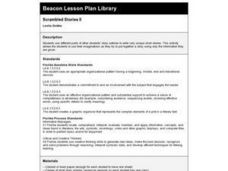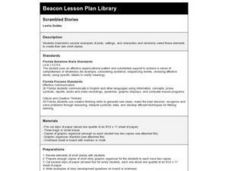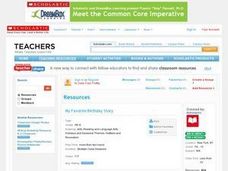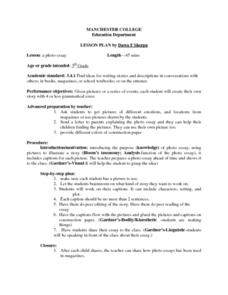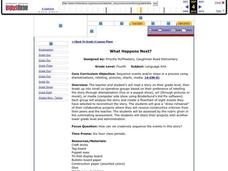Curated OER
Sequencing The Mitten
Practice sequencing as a comprehension strategy. Have your class listen to The Mitten by Jan Brett and participate in guided practice with sequencing events. Then divide everyone into three groups based on understanding for...
Curated OER
Noisy Nora, Studious Students: Story Elements
Alliterative adjective nicknames generate stories inspired by Rosemary Wells' book Noisy Nora (also a thematic complement to any class with children who make a ruckus to get attention). Class members explore basic story elements --...
Curated OER
Scrambled Stories II
Review story elements with your class. They will use examples from a story to develop critical-thinking questions. Then they use a graphic organizer to describe the setting, character, and plot of the story, focusing on how they...
Curated OER
Printing and Publishing
Explore African literature and artwork in a multicultural literacy and art lesson. Begin with a read aloud of Tiger and the Big Wind: A Tale from Africa, and afterward, have kids retell the main events in the story. They...
Curated OER
Story Boards
Students devise story boards to sequence the main events in a story. They draw a picture that demonstrates the main event in each chapter of a story and label it with a sentence.
Curated OER
Sequencing Life Cycles and Daily Activities
First graders sequence story situations. In this sequencing lesson, 1st graders read Charlie the Caterpillar and sequence his life cycle. Students role play the story parts and sing a song about metamorphosis.
Curated OER
Sequencing The Three Billy Goats Gruff
First graders participate in sequencing activities. In this sequencing lesson, 1st graders read the book the Three Billy Goats Gruff. Students retell the story and act out the scenes in groups. Students create a mural of the story...
Curated OER
Scrambled Stories
Character development, setting, and plot? Sounds like the makings of a good narrative story. Young authors read and analyze several narrative examples, and then they use what they know to pen an original composition. They work both in...
Curated OER
Every Picture Tells a Story
Students explore story structure. In this literacy and story structure lesson, students listen to picture books and illustrate a favorite part of the story. Students share their pictures and place them in sequential order on a bulletin...
Curated OER
Theatrical Economics
Read then role-play the characters from story of If You Give A Pig a Pancake. Young actors use improvisation and characterization to create the characters from the story. They will also write and role play original version of the...
Curated OER
Sequencing: Pictures Tell a Story
Students listen to a story and observe five illustrations of the main events drawn by the teacher. They arrange the illustrations in sequential order. Then, working in groups of five, they read stories and select five events, one for...
Curated OER
Story Elements
Third graders identify story elements. In this story elements lesson, 3rd graders look at main idea, characters, point of view, theme and setting. They create a five paneled comic strip from a book.
Curated OER
Where Do We Begin?
Primary learners grasp sequence of events by discussing morning routines and reviewing the story of Little Red Riding Hood. They explore the necessity of correct order of events. As a class, create a story with a beginning, middle, and...
Curated OER
My Favorite Birthday Story
Happy birthday! Pre-K and Kindergarten learners bring in a photograph of their favorite birthday party. They get together in small groups and write about the birthday - with the help of adults. The stories and the photos are displayed on...
Curated OER
Story Quilts-For the Classroom
Students create a classroom story quilt. In this literacy lesson, students recall events from a text and illustrate their favorite part of the story on a quilt piece. The quilt is sewn together to form a classroom quilt.
Curated OER
A Photo Essay
Students analyze photographs, then create their own photo essays by using photos, magazine pictures or drawings to illustrate their stories.
Curated OER
Parts of the Plot: Constructing a Plot Diagram
Sixth graders conduct a plot diagram for a short story. They identify the problem, the rising action, the climax, the falling action, and the resolution. Students are able to sequence events in a story, and identify the parts of the plot...
Curated OER
If You Give a Mouse a Cookie
Students read "If You Give a Mouse a Cookie" by Laura Joffee Numeroff with their teacher, discuss the concept of cause and effect, and create their own story boards for a class story.
Curated OER
Pizzaz!...Story Boxes
Students tell stories, using an oral, free-flow method. The stories can then be literally transcribed or a retold version/interpretation of them can be written down after the telling. High-beginner ESL level. A terrific speaking skills...
Curated OER
A Photo Essay
Young scholars explain the purpose of a photo essay, sequence a series of events, and explain the format in creating a photo essay, which includes a caption for each picture. They complete a photo essay as a creative activity.
Curated OER
Folk Tales for ESL Students
Using the folk tale "The Man, The Boy, and The Donkey" (linked in the lesson) and a SMART board, teachers can help pupils access multiple skills. Reading the story allows learners to create a timeline of the sequence of events based on...
Curated OER
What Happens Next?
Fifth graders complete activities to help them sequence events in a story. In this sequencing lesson, 5th graders read a story and work in groups to retell the story by creating a flowchart of events to reconstruct. Students create their...
Curated OER
Guided Reading -- If You Give a Mouse a Cookie
Students are read the book "If You Give a Mouse a Cookie" page by page and discuss their favorite types of cookies. They predict what they believe will happen next based on what has already happened in the story. They practice putting...
Curated OER
Pizzazz!...Basket Stories
Students discuss the use of connectors and sequence words. They discuss common story endings and beginnings. Students brainstorm ideas for a creative story and compose a story for the rest of the class.




